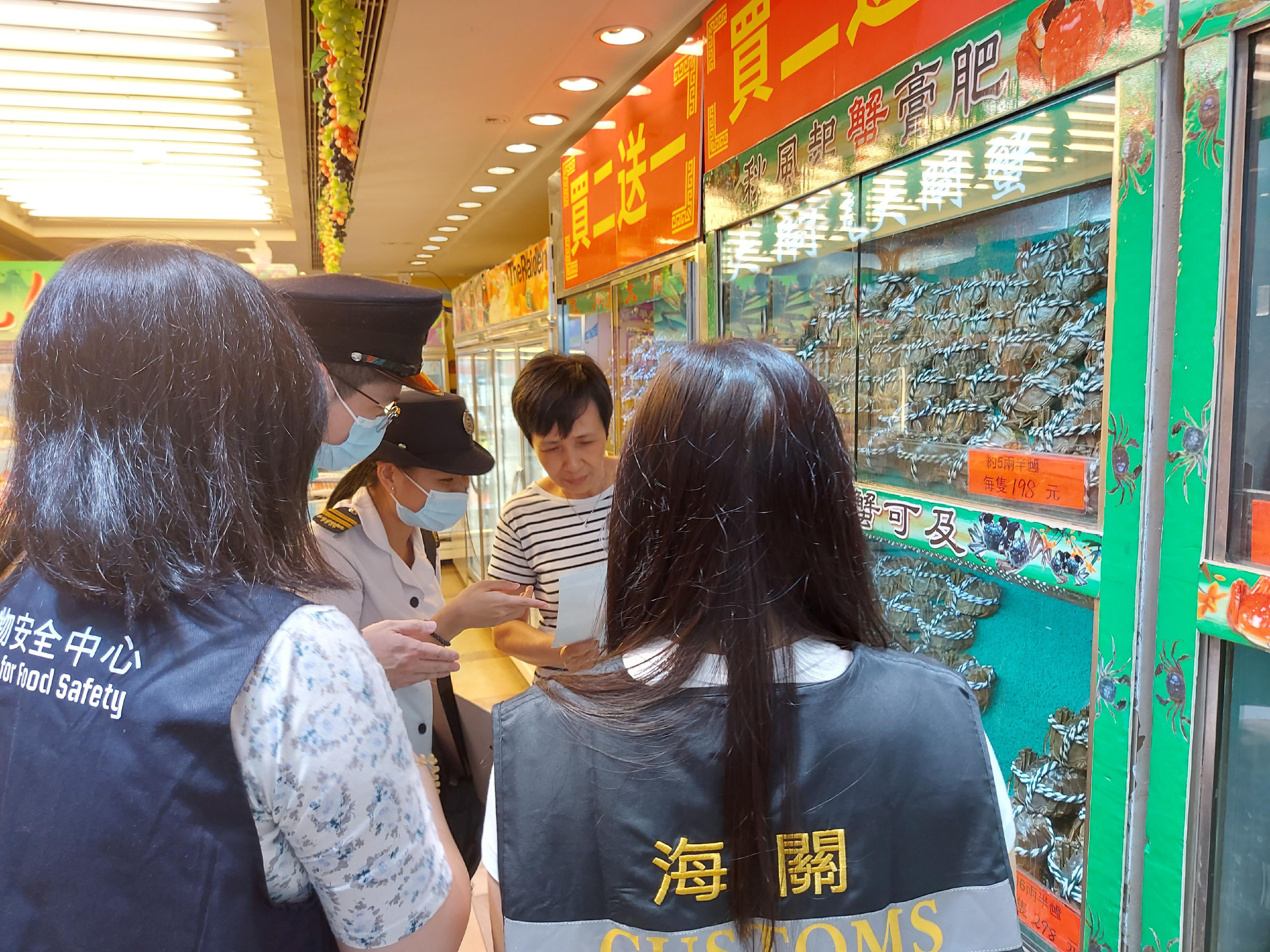FEHD and Hong Kong Customs continue to combat illegal sale of hairy crabs and sale of hairy crabs from dubious sources (with photo)
To safeguard food safety, the Food and Environmental Hygiene Department (FEHD) and Hong Kong Customs launched joint blitz operations from October 29 to inspect selling points of hairy crabs in various districts and combat the illegal sale of hairy crabs, with a view to ensuring that hairy crabs on sale in the market comply with relevant requirements under the laws.
A spokesman for the FEHD said today (November 14), "During the operations, officers from the Centre for Food Safety and the Environmental Hygiene Branch of the FEHD and Customs officers have inspected more than 50 premises selling hairy crabs, including food premises and public market stalls. The source documents and health certificates of the hairy crabs were checked to ensure that the hairy crabs sold at the premises are in compliance with the Public Health and Municipal Services Ordinance (Cap. 132) as well as the Trade Descriptions Ordinance (TDO) (Cap. 362) and are fit for human consumption. The FEHD and Customs officers also distributed promotional leaflets to the operators of the premises, reminding them to pay attention to food safety and comply with relevant requirements under the laws. During the operations, no contravention was found."
Under the Food Business Regulation (Cap. 132X), save with the written permission of the Director of Food and Environmental Hygiene (DFEH), no person shall sell any restricted foods, including shellfish. Operators selling hairy crabs (including physical premises and online sales) shall obtain the Shell Fish (Hairy Crab) Permit or relevant written permission granted by the FEHD. Furthermore, the relevant regulatory condition also stipulates that hairy crabs for sale shall be obtained from a reliable and reputable source. A copy of the health certificate issued by the relevant authority and acceptable to the DFEH shall also be kept. Under the Regulation, any person who operates an unlicensed food business or sells restricted foods without permission commits an offence and is liable to a maximum fine of $50,000 and imprisonment for six months upon conviction.
In addition, according to the Public Health and Municipal Services Ordinance (Cap. 132), all food available for sale in Hong Kong, locally produced or imported, should be fit for human consumption. An offender in this regard is subject to a maximum fine of $50,000 and imprisonment for six months upon conviction. Under the Food Safety Ordinance (Cap. 612), any person who, without reasonable excuse, fails to comply with the record-keeping requirement relating to movement of food commits an offence and is liable to a maximum fine of $10,000 and imprisonment for three months upon conviction.
Customs reminds traders not to apply a false trade description to goods or services, or to supply or offer to supply goods or services to which a false trade description is applied. Those who violate the TDO are liable on conviction to a maximum fine of $500,000 and imprisonment for five years. Customs also attaches great importance to the protection of consumer rights and will take appropriate enforcement action once activities in violation of the TDO are detected in the market.
The FEHD and Customs remind the trade not to import or put on sale hairy crabs with an unknown origin, and consumers should make purchases at reputable shops with the Shell Fish (Hairy Crab) Permit or relevant written permission granted by the FEHD.
If members of the public suspect that there are operators selling hairy crabs without the relevant permits/permissions or the hairy crabs are not accompanied with health certificates, they may make a report by calling the FEHD hotline at 2868 0000 or through email (enquiries@fehd.gov.hk).
In addition, members of the public may make a report to Customs' 24-hour hotline 182 8080 or its dedicated crime-reporting email account (crimereport@customs.gov.hk) or online form (eform.cefs.gov.hk/form/ced002/) if they suspect that hairy crabs bought are of a falsely claimed place of origin.
